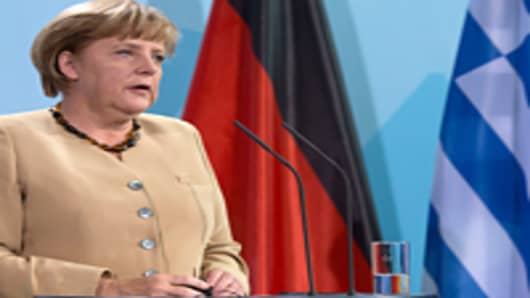The latest Greek debt deal is at the behest of German Chancellor Angela Merkel and the needs of the domestic political landscape there rather than about ensuring Greece's long term economic well- being, analysts told CNBC Tuesday.
"They've done the bare minimum just to keep the show on the road to prevent Greece from falling apart and having to leave the euro in the next few months. They've not done enough to get Greece back to a sustainable economic or fiscal path," Michael Saunders, chief economist for Western Europe at Citi, told CNBC Europe's "Squawk Box".
"A few months ago Merkel herself made a decision that Greece would not leave the euro until the German election is passed because she feared she herself would be blamed for any adverse political and economic consequences. That's why this deal has been done. Merkel wants to keep the show on the road for the time being," he said.
The latest deal, secured late on Monday, will see Greece's debt level lowered to a more sustainable level and lead to the release of the next tranche of aid of $44 billion needed to keep the country solvent.
(Read More: Euro Zone, IMF Secure Deal on Cutting Long-Term Greek Debt)
A German parliamentary vote on the deal is expected later this week on Thursday or Friday.
Alastair Newton, senior political analyst at Nomura, told CNBC.com that the German elections were a significant aspect of the decision to get the deal through.
"The German elections are a huge influence here and it would obviously be very bad for Merkel if anything were to cause a crash in Europe before the elections. Merkel is committed to keeping the euro together but not at any cost. The Greeks now have to deliver on what is being asked of them," Newton said.
Saunders added that once the German elections are over at the end of next year there could be a significant change in attitudes towards Athens and scoffed at the notion that this would be the deal that changes the fortunes for the beleaguered country.
"At that point, as I suspect when the deal is unravelling , what will the creditors do then? The economy is disintegrating we're in the fifth year of recession heading into the sixth and beyond that the seventh and the eight. The longer this goes on it's not going to get any better," Saunders warned.
"What we'll see is, as we've seen repeatedly in the last few years, that the economy underperforms in the face of fiscal austerity. The last deal was only agreed a year ago and that deal has fallen apart already. [It] relies on the confidence fairy returning and the economy somehow returning to growth," he added.
Saunders said that a "Grexit" could occur in two ways: one where the Greeks themselves decide that economic impact of austerity is no longer sustainable or the creditors setting terms which Greece can't meet.
"It's a sad but painful truth that the economics of fiscal austerity are not going to succeed, we should know that by now," he said.
Nicholas Spiro, managing director at Spiro Sovereign Strategy, echoed Saunders' sentiment of a band aid solution to the Greek problem once again as it "merely keeps Greece ticking over for the next few months."
"The definitive and the only realistic solution to Greece's chronic financial woes - official sector debt forgiveness - is a political non-starter as far as euro zone creditor countries are concerned. Even this morning's set of half-measures to lower Greece's debt burden will prove challenging, with the buyback plan mired in uncertainty. The sharp fall in Greek bank stocks this morning speaks volumes about the lack of confidence in the buyback," he said.
Spiro added that a "Grexit" was unlikely any time soon despite the fact that the "bare minimum was being done to keep the Greek show on the road."
-By CNBC's Shai Ahmed, Follow her on Twitter @shaicnbc


